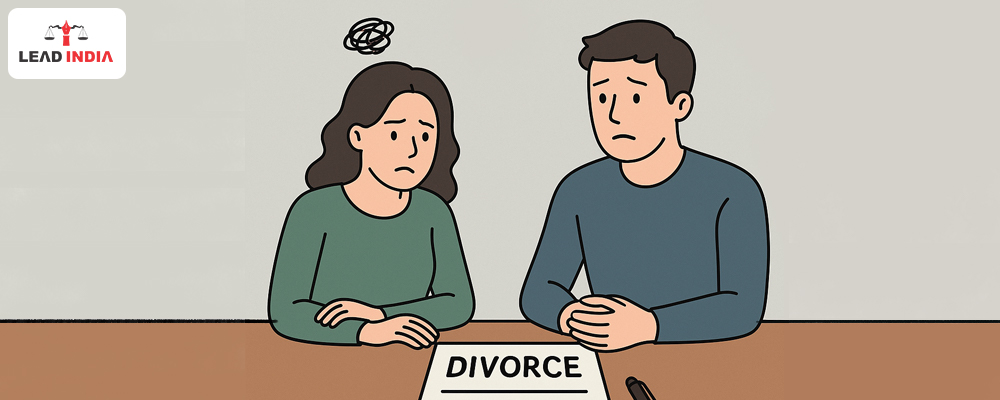When a marriage breaks down and it cannot be repaired or resolved by the parties then the thought of going through or getting divorce comes into mind, a long, stressful court process can feel overwhelming.
Many people think of getting divorce but have fear of getting implicated in a false case or parties think questions like “Can I get a divorce in India without going to court?” The short answer is No, to a large extent.
Divorce Laws in India: Based on Religion
India’s divorce laws are governed by personal laws based on religion. Here’s a quick look at the relevant acts:
- Hindu Marriage Act, 1955 for Hindus, Buddhists, Jains, Sikhs
- Muslim Personal Law (Shariat) Application Act, 1937 and Dissolution of Muslim Marriages Act, 1939 for Muslims
- Indian Divorce Act, 1869 For Christians
- Parsi Marriage and Divorce Act, 1936 For Parsis
- Special Marriage Act, 1954 For civil/interfaith marriages
- Most of these allow for mutual consent divorces, significantly reducing court time.
Need A Legal Advice
The internet is not a lawyer and neither are you. Talk to a real lawyer about your legal issue

Is It Possible to Avoid Court Completely?
You cannot skip court entirely, as Indian law requires at least one physical or virtual appearance before a judge. But in mutual consent divorces, this involvement is not minimal:
- File a joint petition.
- Wait through the 6-month reconciliation period (can be waived).
- Appear briefly before the judge for final consent.
- That’s it a peaceful, procedural closure without prolonged litigation.
What do you understand about Mutual Consent Divorce?
Mutual consent divorce is a legal process where both spouses agree:
a) To end the marriage.
b) On matters like alimony, child custody, and asset division.
c) It avoids blame, courtroom drama, and long-drawn trials.
Benefits include:
- Just 1–2 court visits
- 6–12 month resolution
- Lower legal costs
- Less emotional stress
- Privacy and mutual respect
Who is Eligible for Mutual Consent Divorce?
To file for mutual consent divorce, ensure:
a) You’ve been living separately for at least 1 year.
b) Both parties agree to the divorce.
c) You’ve resolved: Maintenance or alimony, Child custody and visitation (if applicable), Division of shared assets/property
d) You file in the family court with jurisdiction (where either spouse lives or lived together last)
Step-by-Step Process for Mutual Consent Divorce in India
- Joint Petition Filing (First Motion) – Spouses file a joint petition stating reasons for separation and agreements on finances and custody.
- First Court Appearance – Both parties appear to record consent before the judge.
- Cooling-Off Period (6 Months) – Mandatory period under Section 13B(2), but can be waived in special cases.
- Second Motion – Both spouses reaffirm their decision.
- Final Decree – If the judge finds the petition genuine, the divorce is granted.
Documents Required
Make sure these documents are ready before you file:
- Marriage certificate
- ID/address proof of both spouses.
- Passport-sized photos
- Proof of separation (rent agreements, affidavits, etc.)
- Joint petition
- Financial disclosures
- Agreement on custody, alimony, and property split
Benefits of Choosing Mutual Consent Divorce
- Minimum court involvement
- Saves time and money
- No public hearing or cross-examination
- Emotional peace and closure
- Complete privacy
Can I Get a Divorce Online in India?
NO, you can’t get a Divorce online in India, but you can visit online platforms that can help prepare your documents, connect you with expert advocates and file your petition in court and cases are filed and parties are required to be present in person
Note: Indian law still requires court validation of mutual consent. Most courts now allow video conferencing, so at least one virtual or physical appearance is mandatory.
Judicial Observations
In Amardeep Singh v. Harveen Kaur (2017), the Supreme Court allowed the 6-month cooling period to be waived in certain cases. Courts emphasize:
- Consent must be voluntary
- If one party withdraws consent, the petition becomes invalid
Conclusion
Mutual consent divorce offers a dignified way to end a marriage with minimal court hassle. While legal appearance is still required, it’s brief and manageable. With the right legal guidance and honest communication, you can move forward with peace and clarity.
Lead India offers a range of legal services, including free legal advice and online information. You can talk to a lawyer and ask a legal question on various matters, including divorce, through our platform.
FAQs
Q1. Can I avoid court entirely?
A: Not fully. But with mutual consent, you’ll likely need just one short appearance.
Q2. How long does it take?
A: Usually between 6 to 18 months, depending on whether the cooling period is waived.
Q3. Is a lawyer necessary?
A: Not mandatory, but highly recommended for drafting, legal advice, and court coordination.
Q4. What if we disagree on terms?
A: Then it’s not mutual. You’ll need to file for a contested divorce.
Q5. Can the 6-month period be waived?
A: Yes, if separation is over 1.5 years and no chance of reconciliation.
Q6. Can I file for mutual divorce without a lawyer?
A: Yes, but a lawyer ensures paperwork and court formalities are done correctly.





 Talk to a Lawyer
Talk to a Lawyer